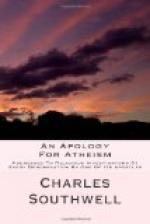This reasoning amounts to logical demonstration (if logical demonstration there can be) of a most essential truth, which in all ages has been obstinately set at nought by dabblers in the supernatural. It demonstrates that something never was, never can be caused by nothing, which can no more be a cause, properly so called, than ’it can be something, or equal to two right angles;’ and therefore that everything could not have had a cause which the reader has seen is the very point assumed by Theists—the very point on which as a pivot they so merrily and successfully turn their fine metaphysical theories, and immaterial systems.
The universe, quoth they, must have had a cause, and that cause must have been a First Cause, or cause number one, because nothing can exist of itself. Oh, most lame and impotent conclusion! How in consistency can they declare nothing can exist without a cause in the teeth of their oft repeated dogma that God is uncaused. If God never commenced to be He is an uncaused existence, that is to say, exists without a cause. The difference on this point between Theists and Atheists is very palpable. The former say, Spirit can exist without a cause; the latter say Matter can exist without a cause. Whole libraries of theologic dogma would be dearly purchased by Hume’s profound remark—’if everything must have a cause, it follows that upon the exclusion of other causes we must accept of the object itself or of nothing as causes.’
If the God of our Deists and Christians is not matter, what is He? Upon them devolves the difficult duty of answering that question. They are morally bound to answer it or make the humiliating confession that they ‘ignorantly worship;’ that with all their boasted certainty as to the existence of their ‘deified error’ they can furnish no satisfactory, or even intelligible account of His [41:1] nature, if indeed a supernatural or rather Unnatural Being can properly be said to have a nature.
The author of ‘Good Sense’ has observed, that names which may be made to mean anything in reality mean nothing. Is not God a name of this class? Our ‘state puppet showmen,’ as my Lord Brougham nicknamed Priests, who talk so much about Gods, forcibly remind one of that ingenious exhibitor of puppets, who, after saying to his juvenile patronisers—’Look to the right, and there you will see the lions a dewouring the dogs,’ was asked—Which is the lion and which is the dogs?’ to which query he replied, ’Vichever you please, my little dears, it makes no difference votsomnever.’ For in exactly the same spirit do our ghostly exhibitors, they who set up the state puppet show meet the inquiries of the grown children they make so handsomely (again we are under an obligation to Lord Brougham) ‘to pay for peeping.’ Children of this sort would fain know what is meant by the doctrines concerning the many ‘true Gods’ they hear such precious rigmaroles about in Church and Conventicle, as well as the many orthodox opinions of that God, whose name is there so often ‘taken in vain.’ But Priests like the showman in question, answer, in language less inelegant to be sure, but substantially the same, ’Vichever you please, my little dears, it makes no difference votsomnever.’




